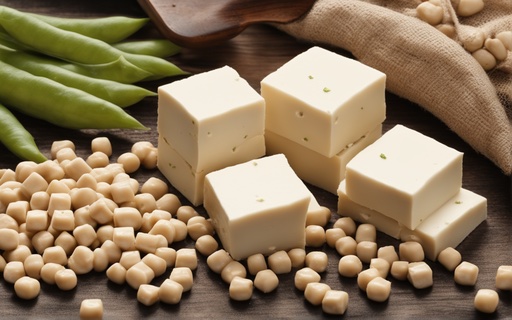Internet Asks: "Is Tofu a Vegetable?"
Tofu, also known as bean curd, is a popular food item in various cuisines, especially in East and Southeast Asian dishes. Given its plant-based origins and the increasing popularity of vegetarian and vegan diets, a common question arises: Is tofu a vegetable? Let's delve into the origins and nature of tofu to answer this question.
sponsored links

Origins of Tofu
Tofu is made from soybeans, a type of legume native to East Asia. Although soybeans are indeed part of the plant kingdom, they are not classified as vegetables. Instead, they fall under the category of legumes, sharing a family with peas, peanuts, and lentils.
The creation of tofu involves a process somewhat akin to cheese-making, albeit from a plant-based source.
Production Process of Tofu:
- 1. Soybean Selection: It all begins with soybeans. These small, versatile legumes are the primary ingredient in tofu production.
- 2. Soaking and Grinding: The soybeans undergo soaking and grinding with water to extract soy milk.
- 3. Coagulation: The soy milk is then coagulated using ingredients like calcium sulfate, magnesium chloride, or lemon juice, leading to the formation of curds.
- 4. Pressing: The curds are pressed to remove excess water, resulting in a block of tofu.
Legumes vs. Vegetables
Understanding the difference between legumes and vegetables is crucial for accurate classification. Legumes refer to the seeds of plants from the Fabaceae family, and they grow in pods. Examples include peas, lentils, and, of course, soybeans. Vegetables, on the other hand, is usually defined as the edible parts of plants that are not involved in the plant's reproductive cycle. This can include roots (like carrots), stems (like celery), and leaves (like spinach).
Tofu, being a processed form of soybeans, would also not be classified as a vegetable. Instead, it's a protein-rich food product made from a legume.
sponsored links
Nutritional Value
Tofu stands out not just for its culinary versatility but also for its nutritional richness:
-
- Protein Powerhouse: Tofu is renowned for its impressive protein content, making it a staple for vegetarians, vegans, and even omnivores seeking diverse protein sources.
-
- Essential Amino Acids: Tofu provides all nine essential amino acids, which are crucial for various bodily functions, including building and repairing tissues.
-
- Mineral Rich: It's a commendable source of iron, vital for oxygen transport in blood. Additionally, the calcium and magnesium in tofu are essential for bone health. The presence of manganese plays a role in enzyme function and nutrient metabolism.
-
- Vitamins: Tofu contains a range of B vitamins, particularly B1, B2, and B3, which are essential for energy production and cell metabolism.
-
- Low in Calories: Despite its nutritional abundance, tofu remains relatively low in calories, making it a favored choice for those monitoring their caloric intake.
-
- Beneficial Isoflavones: These compounds, found in tofu, have been linked to various health benefits, including a reduced risk of heart disease and relief from menopausal symptoms.
Tofu in Dietary Context
Tofu is often used as a meat substitute due to its high protein content and versatility in various recipes, from stir-fries to desserts. Its mild flavor allows it to absorb the tastes of the ingredients with which it’s cooked, making it adaptable to different cuisines. While it’s a crucial component in many plant-based diets, it doesn’t share the same characteristics or nutritional profile as vegetables. Therefore, it shouldn't replace vegetables in your diet but rather complement them, contributing to a balanced and nutritious meal.
Conclusion
While tofu is not a vegetable, it's a nutritious, pretein-rich food derived from soybeans, which are legumes. While it's a cornerstone in plant-based diets, it is essential to consume tofu alongside a variety of vegetables to ensure a balanced intake of all necessary nutrients. Understanding the origins and classifications of food like tofu aids consumers in making informed and healthful dietary choices. For those uncertain about incorporating tofu or other soy products into their diet, consulting with a nutritionist or healthcare provider for personalized dietary advice is always a prudent approach.
sponsored links
References
1. Harvard T.H. Chan School of Public Health. Straight Talk About Soy. https://www.hsph.harvard.edu/nutritionsource/soy/
2. American Heart Association. Clearing up questions on whether tofu is healthy. https://www.heart.org/en/news/2022/10/10/clearing-up-questions-on-whether-tofu-is-healthy#:~:text=Nutritionally%2C%20tofu%20offers%20much%20to,alternative%20to%20animal%2Dderived%20meat.
3. Messina MJ. Legumes and soybeans: overview of their nutritional profiles and health effects. Am J Clin Nutr. 1999 Sep;70(3 Suppl):439S-450S. doi: 10.1093/ajcn/70.3.439s. PMID: 10479216.
4. Harvard T.H. Chan School of Public Health. Legume of the month: Soybeans. https://www.health.harvard.edu/heart-health/legume-of-the-month-soybeans
5. Britannica. Soybean. https://www.britannica.com/plant/soybean
6. Michelfelder AJ. Soy: a complete source of protein. Am Fam Physician. 2009 Jan 1;79(1):43-7. PMID: 19145965.
People are also reading...
Seed Soybean
Soybean Miso
Tofu and Diabetes
Are Carrots Acidic?
Is Truvia the Same as Stevia?
Whole30 What to Expect?
Does Hot Chocolate Have Caffeine?
Are Carrots Acidic?
Are Mangoes Acidic?
Orange Juice pH?
Does Kahlua Have Caffeine?
Calories In a Grilled Cheese?
Ready to level-up?
Create meal plans 10x faster, follow up with your clients through our mobile app, and never struggle with meal planning or recipe management again.